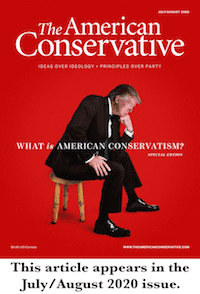Conservatism is a Collection of Losers. It Doesn’t Have To Be.

“I’m a conservative but at this point who cares?” said Donald Trump in 2016. “We’ve got to straighten out the country.”
Perhaps the only reason to care about conservatism today is that a preoccupation with the concept itself often presents an obstacle to “straightening out the country.” Indeed, it mostly prevents self-identified conservatives from achieving their own political goals. Going forward, whatever valuable causes might be associated with conservatives—and in my opinion there are many—will need to be rescued from conservatism.
I am not the first person to point out that conservative political coalitions are mostly just collections of losers, but the point nevertheless bears repeating. Today’s conservatism is merely the name used to categorize the rejects of the post–Cold War order: this includes a few oddball financiers who can’t play nicely with others, extractive industries and other declining sectors, the small businesses most reliant on low-wage, low-skill labor, and a group often referred to as social conservatives who have been almost totally marginalized from mainstream culture. At bottom, nothing holds this gang of misfits together except exclusion from the dominant group of big tech oligarchs, more respectable financial rent seekers, and the leading cultural tastemakers in media and academia.
The conservative favorite Lord Acton famously quipped that power corrupts, but as the self-described Marxist Slavoj Žižek is fond of pointing out, powerlessness corrupts, too. One effect of conservatives’ waning economic and social power has been a retreat into their own self-referential identity groups and subcultures—bizarre little cults ranging from Straussians to Burkeans to the various branches of “Austrian economics.” Conservatives applaud themselves for this apparent devotion to “ideas,” but it’s actually just an effect—and a cause—of their irrelevance with respect to matters of practical importance and almost total intellectual incoherence. Despite this obsession with theoretical inquiry, however, conservatives have been nearly banished from the academy, prestige media, and cultural institutions. The leading “conservative thinkers” of the last 20 years have influenced hardly anyone beyond the next generation of downwardly mobile graduate students.
As Gladden Pappin, deputy editor of American Affairs, has argued, contemporary conservatism is an attempt to articulate the role of non-state institutions rather than a serious approach to wielding political power. The result is an abundance of platitudinous books on Tocqueville and treacly essays on civility, but little serious study of how today’s economy actually works or how to coordinate diverse interests across complex institutions. Thus, even when conservatives happen to win office, typically all that they can imagine doing is reducing their own capacity to exercise power. Conservative foundations and donors have plowed millions into producing mind-numbing Adam Smith documentaries—last year, they even created a virtual pin factory, along with an absurdist farce featuring the Dalai Lama—but they have shown little interest in, say, planning for economic and technological competition with China or understanding the effects of financialization. In part, this may be owing to the fact that conservatism has become nothing more than an ideological gloss retrospectively applied to the machinations of lobbyists and grifters. Yet on a deeper level it seems that the conservative corpus is simply no longer capable of anything but reflexive spasms.
I state these matters so harshly—in a magazine called The American Conservative of all places—not to rub salt into the wounds of long-suffering conservatives, but rather because vast new possibilities have opened up for those willing to throw off the constricting ideologies of the “end of history.” The neoliberal economic system is falling apart under the weight of its own contradictions, while its intellectual and cultural energies appear increasingly exhausted. New policy options and even novel directions in culture are coming into view. New electoral coalitions are emerging to support, for example, more family-oriented economic policies, to strengthen communities from the neighborhood to the nation, and to challenge the moral-cultural dominance of radical liberal individualism.
None of these things will be achieved under the banner of conservatism. And by conservatism, I do not mean any specific agenda such as Reagan’s rickety three-legged stool or other Baby-Boomer-generation enthusiasms. Those are already dead. Instead, what must be overcome is the false pretension of defending (or restoring) established authority, which is inherent to any notion of conservatism. Conservatives must honestly confront the fact that every benevolent order they have claimed to be conserving for at least a quarter century—whether it is the perfect, pre–New Deal free market of their imagination or the “original Constitution” or a “(Judeo-)Christian nation”—is long gone.
For most of my lifetime, conservatives have rationalized their political impotence by dressing up in bowties and pretending to speak for what they imagine to be the real establishment. But the plutocratic-technocratic establishment that actually exists today has no interest in or need for conservatism, except perhaps as a controlled opposition to provide a patina of democratic legitimacy. Moreover, the conservative electoral constituency has been well outside this establishment for a long time. For any effective political action to be possible, this confusion, intentional or not, will have to be overcome. If in the last decade or two of national decline we have learned that the opiate of the masses is opiates, we should also have learned that the opiate of the political losers is conservatism.
Indeed, new possibilities are only opening up because institutional conservatism has already proven to be so weak. The heel Donald Trump found an opening precisely because Principled Conservatives™ could no longer maintain a plausible kayfabe. But any true political victory in overcoming the failures of liberalism will require closing the chapter on conservatism entirely.
In the 1964 anthology What is Conservatism?, Friedrich Hayek contributed an essay titled “Why I Am Not a Conservative.” Almost 60 years later, it is fair to say that Hayek’s neoliberal vision largely triumphed, while the alternatives included in that volume basically failed. For those who genuinely wish to learn from history, then, the only sensible response to the question “What is conservatism?” is, at this point, “Who cares?”
Julius Krein is the editor of American Affairs.
Related: Introducing the TAC Symposium: What Is American Conservatism?
See all the articles published in the symposium, here.
Comments